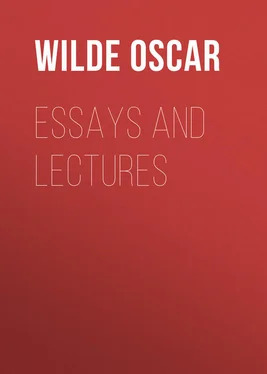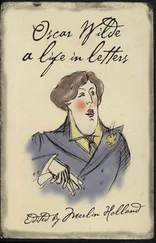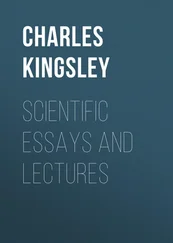Oscar Wilde - Essays and Lectures
Здесь есть возможность читать онлайн «Oscar Wilde - Essays and Lectures» — ознакомительный отрывок электронной книги совершенно бесплатно, а после прочтения отрывка купить полную версию. В некоторых случаях можно слушать аудио, скачать через торрент в формате fb2 и присутствует краткое содержание. Жанр: foreign_home, literature_19, foreign_prose, на английском языке. Описание произведения, (предисловие) а так же отзывы посетителей доступны на портале библиотеки ЛибКат.
- Название:Essays and Lectures
- Автор:
- Жанр:
- Год:неизвестен
- ISBN:нет данных
- Рейтинг книги:3 / 5. Голосов: 1
-
Избранное:Добавить в избранное
- Отзывы:
-
Ваша оценка:
- 60
- 1
- 2
- 3
- 4
- 5
Essays and Lectures: краткое содержание, описание и аннотация
Предлагаем к чтению аннотацию, описание, краткое содержание или предисловие (зависит от того, что написал сам автор книги «Essays and Lectures»). Если вы не нашли необходимую информацию о книге — напишите в комментариях, мы постараемся отыскать её.
Essays and Lectures — читать онлайн ознакомительный отрывок
Ниже представлен текст книги, разбитый по страницам. Система сохранения места последней прочитанной страницы, позволяет с удобством читать онлайн бесплатно книгу «Essays and Lectures», без необходимости каждый раз заново искать на чём Вы остановились. Поставьте закладку, и сможете в любой момент перейти на страницу, на которой закончили чтение.
Интервал:
Закладка:
There is, of course, something a little trivial in some of the instances I have quoted; but in a writer like Herodotus, who stands on the borderland between faith and rationalism, one likes to note even the most minute instances of the rise of the critical and sceptical spirit of inquiry.
How really strange, at base, it was with him may, I think, be shown by a reference to those passages where he applies rationalistic tests to matters connected with religion. He nowhere, indeed, grapples with the moral and scientific difficulties of the Greek Bible; and where he rejects as incredible the marvellous achievements of Hercules in Egypt, he does so on the express grounds that he had not yet been received among the gods, and so was still subject to the ordinary conditions of mortal life ( ἔτι ἄνθρωπον ἐόντα ).
Even within these limits, however, his religious conscience seems to have been troubled at such daring rationalism, and the passage (ii. 45) concludes with a pious hope that God will pardon him for having gone so far, the great rationalistic passage being, of course, that in which he rejects the mythical account of the foundation of Dodona. ‘How can a dove speak with a human voice?’ he asks, and rationalises the bird into a foreign princess.
Similarly he seems more inclined to believe that the great storm at the beginning of the Persian War ceased from ordinary atmospheric causes, and not in consequence of the incantations of the Magians . He calls Melampos, whom the majority of the Greeks looked on as an inspired prophet, ‘a clever man who had acquired for himself the art of prophecy’; and as regards the miracle told of the Æginetan statues of the primeval deities of Damia and Auxesia, that they fell on their knees when the sacrilegious Athenians strove to carry them off, ‘any one may believe it,’ he says, ‘who likes, but as for myself, I place no credence in the tale.’
So much then for the rationalistic spirit of historical criticism, as far as it appears explicitly in the works of this great and philosophic writer; but for an adequate appreciation of his position we must also note how conscious he was of the value of documentary evidence, of the use of inscriptions, of the importance of the poets as throwing light on manners and customs as well as on historical incidents. No writer of any age has more vividly recognised the fact that history is a matter of evidence, and that it is as necessary for the historian to state his authority as it is to produce one’s witnesses in a court of law.
While, however, we can discern in Herodotus the rise of an historic sense, we must not blind ourselves to the large amount of instances where he receives supernatural influences as part of the ordinary forces of life. Compared to Thucydides, who succeeded him in the development of history, he appears almost like a mediæval writer matched with a modern rationalist. For, contemporary though they were, between these two authors there is an infinite chasm of thought.
The essential difference of their methods may be best illustrated from those passages where they treat of the same subject. The execution of the Spartan heralds, Nicolaos and Aneristos, during the Peloponnesian War is regarded by Herodotus as one of the most supernatural instances of the workings of nemesis and the wrath of an outraged hero; while the lengthened siege and ultimate fall of Troy was brought about by the avenging hand of God desiring to manifest unto men the mighty penalties which always follow upon mighty sins. But Thucydides either sees not, or desires not to see, in either of these events the finger of Providence, or the punishment of wicked doers. The death of the heralds is merely an Athenian retaliation for similar outrages committed by the opposite side; the long agony of the ten years’ siege is due merely to the want of a good commissariat in the Greek army; while the fall of the city is the result of a united military attack consequent on a good supply of provisions.
Now, it is to be observed that in this latter passage, as well as elsewhere, Thucydides is in no sense of the word a sceptic as regards his attitude towards the truth of these ancient legends.
Agamemnon and Atreus, Theseus and Eurystheus, even Minos, about whom Herodotus has some doubts, are to him as real personages as Alcibiades or Gylippus. The points in his historical criticism of the past are, first, his rejection of all extra-natural interference, and, secondly, the attributing to these ancient heroes the motives and modes of thought of his own day. The present was to him the key to the explanation of the past, as it was to the prediction of the future.
Now, as regards his attitude towards the supernatural he is at one with modern science. We too know that, just as the primeval coal-beds reveal to us the traces of rain-drops and other atmospheric phenomena similar to those of our own day, so, in estimating the history of the past, the introduction of no force must be allowed whose workings we cannot observe among the phenomena around us. To lay down canons of ultra-historical credibility for the explanation of events which happen to have preceded us by a few thousand years, is as thoroughly unscientific as it is to intermingle preternatural in geological theories.
Whatever the canons of art may be, no difficulty in history is so great as to warrant the introduction of a spirit of spirit θεὸς ἀπὸ μηχανῆς , in the sense of a violation of the laws of nature.
Upon the other point, however, Thucydides falls into an anachronism. To refuse to allow the workings of chivalrous and self-denying motives among the knights of the Trojan crusade, because he saw none in the faction-loving Athenian of his own day, is to show an entire ignorance of the various characteristics of human nature developing under different circumstances, and to deny to a primitive chieftain like Agamemnon that authority founded on opinion, to which we give the name of divine right, is to fall into an historical error quite as gross as attributing to Atreus the courting of the populace ( τεθεραπευκότα τὸν δῆμον ) with a view to the Mycenean throne.
The general method of historical criticism pursued by Thucydides having been thus indicated, it remains to proceed more into detail as regards those particular points where he claims for himself a more rational method of estimating evidence than either the public or his predecessors possessed.
‘So little pains,’ he remarks, ‘do the vulgar take in the investigation of truth, satisfied with their preconceived opinions,’ that the majority of the Greeks believe in a Pitanate cohort of the Spartan army and in a double vote being the prerogative of the Spartan kings, neither of which opinions has any foundation in fact. But the chief point on which he lays stress as evincing the ‘uncritical way with which men receive legends, even the legends of their own country,’ is the entire baselessness of the common Athenian tradition in which Harmodios and Aristogeiton were represented as the patriotic liberators of Athens from the Peisistratid tyranny. So far, he points out, from the love of freedom being their motive, both of them were influenced by merely personal considerations, Aristogeiton being jealous of Hipparchos’ attention to Harmodios, then a beautiful boy in the flower of Greek loveliness, while the latter’s indignation was aroused by an insult offered to his sister by the prince.
Their motives, then, were personal revenge, while the result of their conspiracy served only to rivet more tightly the chains of servitude which bound Athens to the Peisistratid house, for Hipparchos, whom they killed, was only the tyrant’s younger brother, and not the tyrant himself.
To prove his theory that Hippias was the elder, he appeals to the evidence afforded by a public inscription in which his name occurs immediately after that of his father, a point which he thinks shows that he was the eldest, and so the heir. This view he further corroborates by another inscription, on the altar of Apollo, which mentions the children of Hippias and not those of his brothers; ‘for it was natural for the eldest to be married first’; and besides this, on the score of general probability he points out that, had Hippias been the younger, he would not have so easily obtained the tyranny on the death of Hipparchos.
Читать дальшеИнтервал:
Закладка:
Похожие книги на «Essays and Lectures»
Представляем Вашему вниманию похожие книги на «Essays and Lectures» списком для выбора. Мы отобрали схожую по названию и смыслу литературу в надежде предоставить читателям больше вариантов отыскать новые, интересные, ещё непрочитанные произведения.
Обсуждение, отзывы о книге «Essays and Lectures» и просто собственные мнения читателей. Оставьте ваши комментарии, напишите, что Вы думаете о произведении, его смысле или главных героях. Укажите что конкретно понравилось, а что нет, и почему Вы так считаете.












